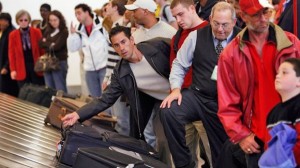(Previous posts about making space can be found here and here.) ![]()
I have performed stand-up comedy four times: three times for church talent shows and once at a work fundraiser. But, I have not yet mustered the courage to try stand-up at a comedy club open mic night, not yet taking that next comedic and soul-baring step, and I’ll tell you why. When I do comedy the nearly universal response I get, when friends approach me after my performance, is this: “That was really funny! I had no idea you do comedy. I never would have guessed.”
I know these people don’t mean it—it’s more of a knee-jerk reaction than a reasoned response—but what they’re telling me is that I’m just not that funny in real life. I get it; I was never the class clown, and no one would mistake me for the life of the party. And my limited funniness is confirmed, apparently, by my family. The first time I was going on stage, my daughter, who was about 10 at the time, blurted out with no small amount of concern in her voice, “Oh no, Dad, are you going to be OK? You’re only funny by accident.” Another time, when one of my sons was 13 he asked, “You’re doing comedy…really??” (He seemed genuinely surprised.) “I mean, good for you, Dad.”
When I expressed feelings of inadequacy about my upcoming comedy routine for my work fundraiser my wife reassured me off-handedly, “Oh, don’t worry. Scientists aren’t that funny, so you don’t have to be very funny to stand out. It’s the perfect situation for you.”
(By the way, this is also true in church settings—just consider what passes for a joke in General Conference, what minimal incongruity or gimpy punchline elicits snickers from the Saints. One time I was proofreading a talk Elder Scott was preparing to give in Portuguese. The first line playfully asked, “Do you want to know how to wake up each morning with a smile on your face? Go to sleep with a hanger in your mouth.” He asked me what I thought. I replied, “Don’t quit your day job.” No, I didn’t actually say that. But I do suspect that comedic success is easier when expectations are low.)
But I’ll tell you two things I’ve learned from doing stand-up. First, when you have the mic, everyone is listening. You are louder than everyone—even the critics and the crying babies. You have a voice. Second, and perhaps even more important to my topic, is that when you are at the mic the people in the audience, deep in their hearts, want you to succeed. This is why some of your best laughs come when a joke bombs and you then provide a bit of commentary on how poorly it went over (e.g., Wow, I stunk that one up, didn’t I?). Your audience laughs, they are sympathetic, because they don’t want to see you fail—they are with you on your journey and they want to arrive at a happy ending as much as you do. Don’t ask me why this is true, but it is true.
So what does this have to do with what I call Mormon Open Mic—that is, Mormon fast and testimony meeting? Well, I have decided that I need to view testimony meeting as an opportunity, a way to add my voice to my community’s conversation about itself, rather than as something I avoid, paralyzed by doubts about my legitimacy as a liberal Mormon who cannot manage to assert, “I know”, but only, “I believe”, or even worse, “I don’t believe”, thus removing myself from public discourse in my ward because I listen too closely and respectfully to that little voice inside my head that insists that my Mormon views don’t count because I’m not mainstream, I’m not inside the story anymore.
I’ve come to realize that for me to stay in the Church, to stay alive in my faith with my little flame burning, I need a voice, and testimony meeting offers it to me if I can work up the gumption to seize it, like reaching over two rows of people to grab my luggage off the baggage claim carousel, rather than waiting timidly to remove it, almost apologetically, the next time around after the crowd has thinned.
So the angst I experience, that sometimes dips into despair, that the yearnings of my soul—the joy and grief of an uncorrelated Mormon—will not be heard by my faith community, that my voice will always be muffled by patriarchy, tradition, and the sweet oppression of our cheery Mormon culture, has, I believe, a remedy, and it is called testimony meeting. We are invited to participate, we are encouraged to participate, sometimes we are even commanded to participate. Come to the pulpit! Bare your soul! Bear your testimony and be one with the Saints! To which I’m learning to say, “Don’t mind if I do.” 🙂
And so I’m striving to get up and speak my mind, to take a few short minutes most months to try being myself in front of my friends and neighbors, to broaden the discourse in my ward, to expand what is acceptable for a Mormon in my community to say and think.
Now this is where the open mic dynamic is my friend. In the ritualistic context of humbly standing before an entire congregation in testimony meeting, where everyone knows how exposed I am and everyone can imagine how fast my heart is beating, I acquire the sympathy of my audience. They know this is difficult and scary, and they desire my success. They may not agree with everything I say, they may wonder what I’ve been drinking in my Postum, but they are on my side because I’m letting my guard down, I’m revealing my vulnerability.
And let’s be honest: my heterodox testimonies don’t even make the needle quiver on the Mormon weirdness scale. Y’all know this is true. I mean, when you follow the old lady who claims the Vietnam war was God’s plan for bringing the Gospel to the Orient and testifies that birth control is the Devil’s brainchild, when you follow the man who takes a flying leap into mumbled stream-of-consciousness about who knows what, and you wonder if he will ever stop until suddenly he does, as if an egg-timer in his brain just went ‘ding’, when you follow the young child who gushes about going to the temple, all dressed in white, to be stuck to her parents, there is almost nothing you can say that will raise an eyebrow in the congregation. So I give myself the pep talk: Go for it! What am I afraid of? I’m tired of cowering in the shadows among my own people—I will attempt to be myself by bearing my testimony, such as it is, in testimony meeting.
Now I’ll confess that I don’t know how to bear my testimony effectively, but I’ll share some things I’ve tried. I try to keep it short. I try to make it personal (e.g., “This has been my experience…”) I try to use language that is familiar, such as quotes from church leaders that may point outside the mainstream discourse. And each time I try to introduce one small item that might stretch people’s minds, that opens a window inside the sometimes stuffy Mormon bus, letting in a cool breeze of broader belief and inclusion, inviting them to view things from a different perspective. All these things I do self-consciously; that is, I prepare my testimonies in advance, at least the main ideas, and then try to share them naturally, as if they were spontaneous, for they surely come from my authentic heart.
I don’t know if this works. I don’t know if it helps anyone else in the congregation. But I don’t know what else to do, so I will continue to do it. And it certainly helps me. I feel empowered and hopeful, and I suspect that at least several people on any given Sunday are struggling with their place in the Church, and perhaps I am supplying them some comfort and encouragement.
The blogger Andrew Sullivan recently predicted that the great conflict of the 21st century would be between modernity and fundamentalism. He suggests that, “The only way through this impasse is through religious reform…This may take more than my lifetime. But proving the ineptness of theocracy, exposing the fallacies of the fundamentalist psyche, while treasuring varieties of religious experience that include within them a toleration of the conscience of others, is surely the only way forward…But if it is not possible, then we face a century of warfare and social dysfunction. The unanswered question, to my mind, is whether this [polarization] dynamic has so purged religious institutions of free thinkers and writers and theologians and saints that it has sealed its own – and everyone else’s – demise. As a Christian I refuse to believe that. But as a writer and observer of the world, it becomes harder each day.”
This resonates with me, so I’m fearfully and hopefully going to add my little, itty-bitty reforming voice to the Mormon mix. I hope you will too.





Great post! A couple of thoughts, which I will give in list form, to save myself the trouble of coming up with transitions:
1) I’ve been referring to Fast & Testimony meeting as “Open Mic Sunday” for a long time. I thought it was just me!
2) When I was a member of one of the Berkeley wards, I remember on more than one occasion someone coming to the podium during testimony meeting to share both their belief and their doubt. I never felt like I wanted such an expansive audience for my doubts, but I thought it said really good things about the sense of community in that ward that people felt comfortable enough to do that.
3) When you speak of the nervousness of sharing something heterodox, and then contrast that with the weirdness that we all hear over the pulpit from time to time–that really resonates. I spoke in church a few Sundays ago. The bishop asked me to speak about interacting with people from other faiths. I think he intended that I speak on missionary work, but I decided that I wanted to talk about what we can learn from those of other faiths. I was really nervous about this, because this isn’t the traditional Sacrament meeting topic, right? I quoted extensively from scripture and general authorities, so that no one could accuse me of going too far off script. But there was a quote on interfaith relations from a Lutheran bishop that I also found really powerful, so I included it, even though I was a bit nervous about how people would react.
Wouldn’t you know it–the speaker after me quoted Jeffrey Dahmer. Really. I wish I was making that up, but I’m not. It really struck me the contrast here–I was worried about quoting a respected clergyman of another faith, and yet the next speaker quoted a serial killer! This made me think that maybe I’m more cautious than I need to be. And made me resolve to keep sharing my real thoughts.
I really like your approach, Mike. Like Laura, I think you’re spot on about F&T meeting already being full (often) of stuff that’s pretty uncorrelated in lots of ways. I also like your point about people rooting for you. I think that’s probably true. Certainly I know I cringe for people when they say embarrassing stuff, and I’m happy for them when they say interesting or touching things.
I wish I were in your ward so I could hear your testimonies in real life.
Laura, your Jeffrey Dahmer story is AMAZING, and I love the point both you and Mike make that no matter how crazy we might think we sound, there are way crazier crazies to compete with. Mike, your open mic approach is a great one that I’m totally planning to steal.
Stand and deliver.
I’ll have to start listening again in F&T meeting.
I was definitely the crazy in my last ward!
Kind of makes me want to start going to Sacrament Meeting again. I admire your courage. Thank you for the inspiring words.